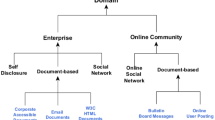Abstract
This paper presents MKM, a meta-knowledge model to manage knowledge reliability, in order to extend a CBR system so that it can reason on partially reliable, non expert, knowledge from the Web. Knowledge reliability is considered from the point of view of the decision maker using the CBR system. It is captured by the MKM model including notions such as belief, trust, reputation and quality, as well as their relationships and rules to evaluate knowledge reliability. We detail both the model and the associated approach to extend CBR. Given a problem to solve for a specific user, reliability estimation is used to filter knowledge with high reliability as well as to rank the results produced by the CBR system, ensuring the quality of results.
Access this chapter
Tax calculation will be finalised at checkout
Purchases are for personal use only
Preview
Unable to display preview. Download preview PDF.
Similar content being viewed by others
References
Naudet, Y., Latour, T., Vidou, G., Djaghloul, Y.: Towards a novel approach for high-stake decision support system based on community contributed knowledge base. In: 10th International Conference on Intelligent Systems Design and Applications (ISDA), pp. 730–736 (2010)
Skaf-Molli, H., Desmontils, E., Nauer, E., Canals, G., Cordier, A.E., Lefevre, M.: Knowledge Continuous Integration Process (K-CIP). In: 21st World Wide Web Conference - Semantic Web Collaborative Spaces Workshop, pp. 1075–1082 (2012)
Richards, D.: A social software/web 2.0 approach to collaborative knowledge engineering. Information Sciences 179(15), 2515–2523 (2009)
Hendricks, V.F., Pritchard, D.: New waves in epistemology. New Waves in Philosophy. Palgrave Macmillan (2008)
Wang, R.Y.: A product perspective on total data quality management. Commun. ACM 41(2), 58–65 (1998)
Even, A., Shankaranarayanan, G.: Utility-driven assessment of data quality. SIGMIS Database 38(2), 75–93 (2007)
Marsh, S.P.: Formalising Trust as a Computational Concept. PhD thesis, University of Stirling (1994)
Cook, K.S., Hardin, R., Levi, M.: Cooperation Without Trust? The Russell Sage Foundation Series on Trust. Russell Sage (2007)
Grandison, T., Sloman, M.: Trust management tools for internet applications. In: First International Conference on Trust Management, pp. 91–107 (2003)
Golbeck, J.A.: Computing and applying trust in web-based social networks. PhD thesis, University of Maryland (2005)
Castelfranchi, C., Falcone, R.: Principles of Trust for MAS: Cognitive Anatomy, Social Importance, and Quantification. In: Third International Conference on Multi Agent Systems (ICMAS 1998), p. 72 (1998)
Artz, D., Gil, Y.: A survey of trust in computer science and the Semantic Web. Web Semantics: Science, Services and Agents on the WWW 5(2), 58–71 (2007)
Jøsang, A., Ismail, R.: The beta reputation system. In: Proceedings of the 15th Bled Electronic Commerce Conference, pp. 324–337 (2002)
Abdul-Rahman, A., Hailes, S.: Supporting Trust in Virtual Communities. In: HICSS, p. 9 (2000)
Knap, T., Mlýnková, I.: Revealing beliefs influencing trust between members of the czech informatics community. In: Datta, A., Shulman, S., Zheng, B., Lin, S.-D., Sun, A., Lim, E.-P. (eds.) SocInfo 2011. LNCS, vol. 6984, pp. 226–239. Springer, Heidelberg (2011)
Quijano-Sánchez, L., Bridge, D., Díaz-Agudo, B., Recio-García, J.A.: A case-based solution to the cold-start problem in group recommenders. In: Agudo, B.D., Watson, I. (eds.) ICCBR 2012. LNCS, vol. 7466, pp. 342–356. Springer, Heidelberg (2012)
Huynh, T.D., Jennings, N.R., Shadbolt, N.R.: An integrated trust and reputation model for open multi-agent systems. Autonomous Agents and Multi-Agent Systems 13(2), 119–154 (2006)
Neisse, R., Wegdam, M., Van Sinderen, M., Lenzini, G.: Trust management model and architecture for context-aware service platforms. In: On the Move to Meaningful Internet Systems: CoopIS, DOA, ODBASE, GADA, and IS, pp. 1803–1820 (2007)
Cordier, A., Fuchs, B., Lana de Carvalho, L., Lieber, J., Mille, A.: Opportunistic acquisition of adaptation knowledge and cases - The IaKa Approach. In: Althoff, K.-D., Bergmann, R., Minor, M., Hanft, A. (eds.) ECCBR 2008. LNCS (LNAI), vol. 5239, pp. 150–164. Springer, Heidelberg (2008)
Leake, D.B., Whitehead, M.: Case provenance: The value of remembering case sources. In: Weber, R.O., Richter, M.M. (eds.) ICCBR 2007. LNCS (LNAI), vol. 4626, pp. 194–208. Springer, Heidelberg (2007)
Saaya, Z., Smyth, B., Coyle, M., Briggs, P.: Recommending case bases: Applications in social web search. In: Ram, A., Wiratunga, N. (eds.) ICCBR 2011. LNCS, vol. 6880, pp. 274–288. Springer, Heidelberg (2011)
Schafer, J.B., Frankowski, D., Herlocker, J., Sen, S.: The adaptive web. In: Brusilovsky, P., Kobsa, A., Nejdl, W. (eds.) Adaptive Web 2007. LNCS, vol. 4321, pp. 291–324. Springer, Heidelberg (2007)
Badra, F., Bendaoud, R., Bentebitel, R., Champin, P.-A., Cojan, J., Cordier, A., Després, S., Jean-Daubias, S., Lieber, J., Meilender, T., Mille, A., Nauer, E., Napoli, A., Toussaint, Y.: Taaable: Text Mining, Ontology Engineering, and Hierarchical Classification for Textual Case-Based Cooking. In: ECCBR Workshops, Workshop of the First Computer Cooking Contest, pp. 219–228 (2008)
Gaillard, E., Lieber, J., Nauer, E.: Adaptation knowledge discovery for cooking using closed itemset extraction. In: The Eighth International Conference on Concept Lattices and their Applications, CLA 2011 (2011)
Author information
Authors and Affiliations
Editor information
Editors and Affiliations
Rights and permissions
Copyright information
© 2013 Springer-Verlag Berlin Heidelberg
About this paper
Cite this paper
Gaillard, E., Lieber, J., Naudet, Y., Nauer, E. (2013). Case-Based Reasoning on E-Community Knowledge. In: Delany, S.J., Ontañón, S. (eds) Case-Based Reasoning Research and Development. ICCBR 2013. Lecture Notes in Computer Science(), vol 7969. Springer, Berlin, Heidelberg. https://doi.org/10.1007/978-3-642-39056-2_8
Download citation
DOI: https://doi.org/10.1007/978-3-642-39056-2_8
Publisher Name: Springer, Berlin, Heidelberg
Print ISBN: 978-3-642-39055-5
Online ISBN: 978-3-642-39056-2
eBook Packages: Computer ScienceComputer Science (R0)




